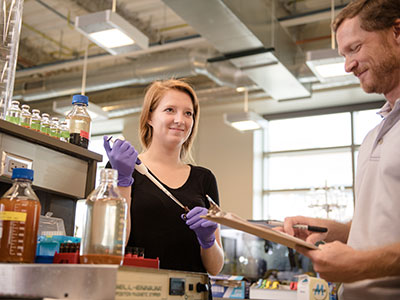 Kassidy O’Malley, doctoral environmental engineering student and graduate assistant in the Opus College of Engineering, has been awarded the National Science Foundation’s Graduate Research Fellowship.
Kassidy O’Malley, doctoral environmental engineering student and graduate assistant in the Opus College of Engineering, has been awarded the National Science Foundation’s Graduate Research Fellowship.
The National Science Foundation’s Graduate Research Fellowship Program honors individuals early in their graduate careers who have demonstrated potential for significant research achievements in STEM fields or STEM education.
O’Malley’s research through the fellowship will focus on tracking antibiotic resistance in Milwaukee’s stormwater infrastructure. She will explore how bacteria becomes resistant to antibiotics, how resistance hotspots form and the opportunities to engineer water infrastructure systems to minimize the threats to public health presented by antibiotic resistant bacteria.
“I view this fellowship as a great honor and an opportunity,” O’Malley said. “The overuse of antibiotics and the subsequent environmental concerns are very disconcerting topics that have interested me since my undergraduate career. But the connection between humans and the environment in this case is very direct, which tells me change and improvements can be made by simply bringing more attention to the problem. That is exactly what I aim to achieve.”
O’Malley’s advisers Dr. Patrick McNamara and Dr. Walter McDonald of the Civil, Construction and Environmental Engineering Department, said she is an exceptional researcher with a strong work ethic and passion for using knowledge to better the world.
“These NSF Fellowships fund the brightest rising stars in the field, and Kassidy is most deserving,” McNamara said. “She balanced being a prolific undergraduate researcher, a devoted Engineers Without Borders volunteer and a tremendous student in the classroom. She will now pivot into a new area for her doctorate degree. Her research on how biological pollutants move through the environment is especially timely given the pandemic.”
O’Malley said she hopes her research helps sound the alarm on the environmental impact of the over prescribing and improper disposal of antibiotics, and that her work propels her to a career analyzing the intersection of human behavior and the environment.
“We are thrilled for Kassidy to be honored with the NSF’s Graduate Research Fellowship,” said Dr. Kristina Ropella, Opus Dean of the Opus College of Engineering. “This prestigious award commends her dedication to her research, and we wish Kassidy and her advisers, Dr. McDonald and Dr. McNamara, all the best as they continue this important work.”
The National Science Foundation is an independent agency of the United States government supporting fundamental research and education in all the non-medical fields of science and engineering. Its fellowship program is a critical part of the agency’s strategy to develop the globally engaged workforce necessary to ensure the nation’s leadership advances science and engineering research and innovation.


